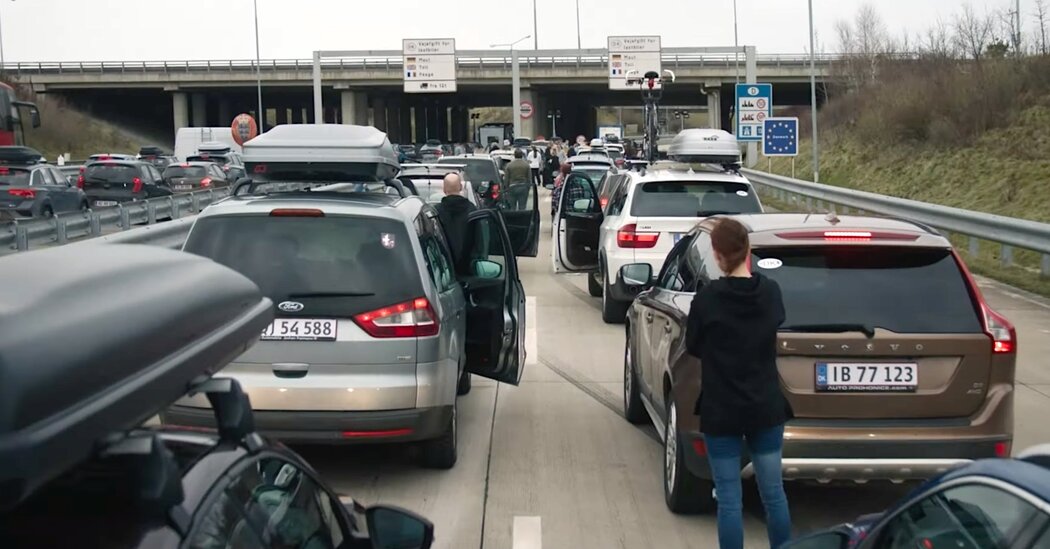The mini-series “Families Like Ours” on Netflix has an attention-grabbing premise: An entire country, Denmark, decides to shut itself down before climate change can do the job for it. Six million Danes start looking for new homes. Relocation plans are drawn up with Scandinavian efficiency, but European neighbors look upon waves of relatively well-off white refugees with the same distaste they show for Africans and Middle Easterners.
The seven-episode series is the first from the Danish filmmaker Thomas Vinterberg, known for founding the no-frills Dogme 95 movement with Lars von Trier and, 26 years later, being nominated for a best director Oscar for “Another Round,” which won best international feature in 2021. The handsomely appointed “Families Like Ours,” which Vinterberg wrote, with Bo Hr. Hansen, and directed, breaks just about every rule in the Dogme manifesto, as his films have all along. It is a high-class consumer item, deliberate and hushed.
It does, however, have something in common with his one true Dogme film, “The Celebration” from 1998. It subjects an extended Danish family to pressure and traces the fissures of guilt and dependency, the outbreaks of bad behavior and gallantry, that result. “The Celebration,” released when Vinterberg was 29, did this via transgressive, occasionally puerile black humor; “Families Like Ours” offers restrained, tasteful domestic drama. The contrast is startling, but the underlying satisfactions are similar.
The new series (it premiered Tuesday on Netflix) will be categorized as a climate-change drama, and it is that. The story appears to take place in an unspecified but near future when waters have risen and efforts to hold them back have met with varying success. But the evidence of danger is mostly offscreen; the crisis is suggested through newscasts and ominous puddles. Vinterberg imagines that the climate crisis will arrive not in floods and heat but in bureaucracy and confusion — endless lines, indecipherable rules, arduous journeys, a constant assault on hope. His vision may not be easily dramatic, but it is convincing.
(The overall premise is a more difficult sell. Would the Danes, as disciplined and regimented as they might be, really leave their country as obediently as the series portrays? Wouldn’t many congregate on high ground and fight to stay? The show’s failure to take on that possibility is a problem.)
The show is also defined, in part, by the obvious reversal it plays on our expectations for stories about refugees. It is formerly comfortable white people who are standing in the lines, yelling across bank counters and nakedly pleading for handouts and favors. They are shocked by the conditions they face once they make it to Paris or Bucharest.
The show’s likely audience, on Danish TV (where it was shown last winter) and on Netflix, is surely implicated in the “ours” of the title. Vinterberg sympathetically dissects the Danish national character, as he did, in a more narrowly focused way, in his examination of the role of drinking in “Another Round.” Characters are stripped of their assumptions, and we wait to see if they find new ways of making sense of life.
As you watch “Families Like Ours,” though, the apocalyptic shivers and cultural examination are subsumed into the show’s primary presentation, which is very high-grade melodrama. It’s “This Is Us” with a light seasoning of “Children of Men.” That the Danish national character is frequently found wanting is less a social critique than a framework for soap opera.
The contrivances sometimes show through, especially in the early episodes, and a recurring hint that one character has second sight is just ghostly, distracting window dressing. But Vinterberg’s writing and direction, and most of the performances, are sufficiently understated that the drama works on you, and by the last episodes the physical and psychological travails of the fleeing Danes have real force. (The extremity of the imagined situation makes it easier to accept the truly awful decisions the characters keep making.)
At the center of the story are a Copenhagen architect, Jacob (Nikolaj Lie Kaas), and his college-age daughter, Laura (Amaryllis August). Jacob’s bluff, overbearing confidence and friendliness begin to break down as his livelihood disappears and he desperately plots an escape to France. Laura, involved in a new romance and worried about her divorced mother, is overwhelmed; smart but naïve, she is pulled in every direction by her emotions. But so is everyone else, which may be the show’s ultimate message.
Jacob and Laura are enmeshed within a web of wives, ex-wives, in-laws and friends, played by some of Denmark’s best-known actors. In addition to Kaas, the cast includes Paprika Steen as Jacob’s ex and Laura’s mother; Magnus Millang of “Another Round” as a developer whose wealth both cushions him and involves him in violence; and David Dencik, a specialist in shifty malcontent, as the developer’s brother. Less well known, but very good, are Albert Rudbeck Lindhardt, as Laura’s gallant boyfriend, and Helene Reingaard Neumann, as Jacob’s miraculously patient second wife.
“Families Like Ours” ends with a wedding, the way a proper romantic melodrama should. But for the central characters there are no resolutions, just new circumstances, which they may or may not be able to accept as fresh starts. Vinterberg offers neither doom nor easy optimism; he just shows us a few of the six million stories in the closing country.











